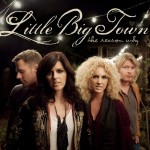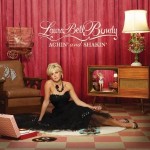There was a lot of good music out there in 2010, provided you knew where to look. Sometimes, you could even find it on the radio. Here are the top ten albums of 2010, according to our staff:

#10
Easton Corbin
Easton Corbin
With the charisma of Clay Walker and the chops of George Strait, Easton Corbin sauntered onto the mainstream country music scene with a hit song that –refreshingly– name-checked “country” in all the right ways. He needs no such affirmation, though, as his debut album is a collection of effortlessly neo-traditionalist songs, ripe with sincerity. It’s fair to compare Corbin to his obvious influences, but there’s something about the natural, youthful effervescence he brings to his music that makes it sparkle all on its own. – Tara Seetharam
Like an old, trusted friend, Freight Train is easy to take for granted – and that’s a shame, because it’s as rousing as any of the boundary-pushing albums released this year. Jackson returns to his signature sound on this album, sinking comfortably into the set of twelve songs but never skimping on emotional investment. From the smoking “Freight Train” to the exquisite “Till the End” to the shuffling “I Could Get Used To This Loving Thing,” Jackson reminds us that his formula of bare-bones authenticity and quiet charm is as relevant and rewarding as ever. – TS

#8
I Am What I Am
Merle Haggard
You know what’s so great about a veteran country star acting their age? In the process, they prove that those on the latter end of their life are every bit as interesting – more so, really – than the young folks that dominate all forms of media today.
Haggard’s body may have aged. His voice, maybe a little bit. But his razor-sharp songwriting is still as potent as ever, whether he’s writing a love song, reflecting on politics on his lifetime, or simply telling the story of an entire life through the house that they never got around to moving up from. The album’s title track would’ve sounded defiant in his younger years, but today, it’s as calm and confident a statement of self-assurance as Frank Sinatra singing “My Way.” – Kevin Coyne

#7
The Reason Why
Little Big Town
A welcome return by the most sonically unique act in mainstream country. Several reviews of this album have pegged Karen Fairchild as the group’s star; I say all four members are compelling soloists, and the real star is still the harmonies, which imbue each song they touch with unique textures and communal warmth.
The title track or “All the Way Down” would feel like slight filler in most artists’ hands; with Little Big Town, they become campfire anthems. “Rain on a Tin Roof” could be a snoozer; with Little Big Town, you actually hear the rain as the voices swell. They’re even better when they and producer Wayne Kirkpatrick take chances with the arrangements; check the groovy beat driving “Runaway Train” or the swampy gospel trimmings of “Little White Church.” Continued experimentation encouraged – though what’s here already sounds mighty fine. – Dan Milliken

#6
Lifted Off the Ground
Chely Wright
The spectrum of Lifted Off The Ground is wide, ranging from tender-to-the-touch to caustically honest to brilliantly clever (the fantastic “Notes to the Coroner”) – and that just describes its lyrics. Sonically, it’s a blast of sounds, expertly crafted but largely diverse. In the hands of another artist, the sum of all these mismatched parts might have been disastrous, but Wright is the glue that holds this album together, an artist staunchly committed to exploring her perspective, her emotions and herself, painful and messy though the process may be. The result is an album that cuts more deeply than perhaps anything else released this year. – TS

#5
Achin’ and Shakin’
Laura Bell Bundy
She can sing, she can write, and she’s got as clear a point of view that shines through so clearly it’s unmistakably her own. Much has been made of the concept album set up – six Achin’ ballads, followed by six Shakin’ rockers. But what could have been a gimmick, and certainly would’ve been with weaker material, ends up a timely reminder of the album as an art form in the first place.
In an era where albums are overly bloated with more songs than there are ideas, only to be whittled down to a few tracks cherry-picked for the iPod, Achin’ and Shakin’ demands to be listened to in sequence and in its entirety. Not because it’s so deep and meaningful. Just because it’s pure entertainment. – KC
Smart, frank, audacious and sneakingly sensitive, Welder feels like Elizabeth Cook properly claiming the spirit of country’s pioneering women as her own. Very much her own – who else could include one song called “Yes to Booty” and another called “Mama’s Funeral” on the same album and have them both totally work? It can be a bit of tonal whiplash if you’re the full-listen-through type, but the high quality, at least, is pretty consistent. – DM

#3
Ghost Train: The Studio B Sessions
Marty Stuart
Marty Stuart is lauded for his preservation of country music history. He’s even published a book of photos that essentially chronicles country music. So, it’s only fitting that he creates an album that recognizes the history of the music as well.
Ghost Train is a crisp collection of mostly original songs that hearkens back to the sounds of yesteryear while still managing to sound accessible to the modern listener. The arrangements are variations of what is generally accepted as traditional country music. Therefore, they’re not narrowed down to a single sound, but rather, the album represents several facets of the traditional side of country
music history.
As a result, the ghosts of country music legends can be heard on this project, including Johnny Cash, Porter Wagoner and Waylon Jennings. Not only are their signature sounds utilized at various points, but Cash and Wagoner both contributed in their own ways – Cash being the co-writer of the philosophically conscious “Hangman” (the last song that he wrote before he died) and Wagoner being the inspiration behind the mostly spoken “Porter Wagoner’s Grave.”
No song from this album was played on mainstream radio in 2010. However, by using mostly new and all engaging songs, Ghost Train is a wonderful lesson on where country music came from, even as it has drastically changed over the years. – LW

#2
The Guitar Song
Jamey Johnson
This generous 25-track album is divided into two discs: black for the darker songs and white for the lighter fare. While the black disc doesn’t get as bleak as some of the famously dark material on his previous album, it still covers difficult territory in loneliness, poverty, disappointment, heartbreak and the other themes that make a rich country song. The best of these songs include “Lonely at the Top” (a previously unrecorded Keith Whitley co-write), the dark and swampy “Poor Man’s Blues”, the covers of “Set ‘Em Up Joe” and “Mental Revenge” and the desperate “Can’t Cash My Checks.”
The white disc lightens up, but only as much as one might expect from the mostly morose Johnson. Life still isn’t all roses and sunshine, but we’re given relief thanks to glimpses of sensitivity, love and reminiscences, along with comparison to a dog (“Dog in the Yard”) and the personification of a guitar (“The Guitar Song”). The highlight of this disc is the live recording of “That’s Why I Write Songs”, as it pays tribute to his songwriting heroes.
As was the case with Johnson’s breakthrough album, That Lonesome Song (one of Country Universe’s Best Albums of 2008), The Guitar Song is not perfect. But like it is with the man and voice who sings these songs, it doesn’t aim to be perfect, which is the beauty of this album. There’s no glossiness, there’s no auto tune to make a rough voice smoother, and its purpose is neither to get people’s feet moving nor fists pumping. Instead, we’re allowed to have some fun, but we’re also required to face hard times and reality. – LW

#1
Up On the Ridge
Dierks Bentley
It’s admirable that Bentley took on an artistically challenging project that plucked him out of his comfort zone. It’s heartening that his intentions seem pure and firmly rooted in his passion for country music. And it’s inspiring that, as a once commercially successful artist, he’s daring the mainstream to pay attention to his oddball project – and maybe even embrace it.
But let’s be honest: none of this would have mattered much if the result hadn’t been an album as rich and vibrant as Up On The Ridge. Is it bluegrass or bluegrass-flavored? Heck if I know, but it’s so interesting -sonically, lyrically and collaboratively – that it transcends its classification. With its progressive mixture of sounds, voices and ideas, it strikes an intriguing balance of relevant and reverent, and that’s exactly what we need to move the country music genre forward. – TS

